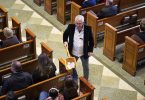Archdiocese looks to ensure a safe environment for children
by Joe Bollig
joe.bollig@theleaven.org
KANSAS CITY, Kan. — The story is painful and familiar: allegations of sexual abuse of a minor by a trusted figure, charges of inaction and denial by higher-ups, victims, and lawsuits.
This time, the allegations are directed against a swimming coach, a local club, and a national swimming competition organization.
The aforementioned is a reminder that the sexual abuse of minors is by no means only a church issue. There have also been recent stories about abuse occurring in schools, youth sports, and the Boy Scouts.
“Because of the focus that’s been placed upon the Catholic Church, and in particular the Catholic clergy, there has been an impression made that this is a Catholic problem, and it’s something that’s a problem for Catholic clergy,” said Archbishop Joseph F. Naumann. “In reality, it’s a societal-cultural problem. Most abuse takes place within the family.”
Although a lot of criticism has been directed at the church, one of the best models for creating safe environments for the protection of youth may be the church.
The Catholic Church in the United States has gone to tremendous lengths to address the issue of sexual abuse of minors since the U.S. bishops wrote the Dallas “Charter for the Protection of Children and Young People” in June 2002.
If clubs, organizations and schools need a model to emulate, they could check out the church, said Father John Riley, archdiocesan chancellor and safe environment coordinator.
“I’m not aware of what policies or procedures they have in place, but if they want to look at a thorough system, all they need to do is visit our Web site and look at the tools we’re using to protect children in the church,” said Father Riley. “They would find a very thorough and exhaustive system in the church.” Even though sexual abuse of children is a broader societal-cultural problem, our expectations for the church should be higher, said Archbishop Naumann. “Our expectations of the church rightly should be higher,” he said. “There should be a greater level of safety within the church than in the broader society. So, in that sense, all the focus on the church has been helpful, and it has really challenged us to set a higher standard for ourselves as the church, which is appropriate.”
That higher standard was set with the establishment of a Safe Environment program for children and youth in the archdiocese after 2002.
“Our program in the archdiocese was initially approved by Archbishop James P. Keleher, and then Archbishop Naumann,” said Father Riley. “It’s a comprehensive program which has complied with the charter that was signed by the bishops in Dallas.”
The program includes protection, prevention, awareness, reporting, resources, victim assistance and training. The program is designed to respond very quickly to allegations involving minors, with immediate reporting to authorities at the county or state level.
“An important part of that program is our Virtus training,” said Father Riley.
Anyone in the church who has substantial contact with minors — priests, deacons, religious, teachers, coaches, school staff, parish personnel, volunteers — is required to undergo a background check.
Next, they are required to attend Virtus child protection and awareness training, or Teaching Touching Safety. Afterward, they are required to do continuing training through Virtus online bulletins.
Archdiocesan employees are also required to read and sign the archdiocesan Child Protection Policy, Code of Ethical Standards, and Harassment Policy.
The archdiocese has also widely distributed blue, four-by-eight-inch cards that have reporting phone numbers and procedures and a brief summary of a plan of child protection.
“We do more than just pass out these cards,” said Father Riley. “They have to be posted visibly in various locations — every church vestibule and every school lobby. I’ve even seen them in restrooms.”
“If something should ever happen,” he continued, “or if there is suspicious activity that someone needs to report, they don’t have to wonder who they go to or where they go. It’s right there in front of them.”
And in an additional effort to inform and establish transparency, these same resources and archdiocesan policies are on the archdiocesan Web site at: www. archkck.org. Anyone can go to the site and click on “Protecting God’s Children” on the left side of the home page.
“Our child protection policy is readily accessible on our Web site for anyone who wants to see it,” said Father Riley. “It is very extensive and very thorough. It’s all right there.”
In an additional effort to encourage transparency and effectiveness, the archdiocese undergoes annual compliance audits of its Safe Environment program.
“The U.S. Conference of Catholic Bishops has contracted with the Gavin Group for annual, independent audits,” said Father Riley.
“Last year, we had an audit and onsite reviews of 21 randomly selected parishes and schools across the archdiocese,” he said. “[The auditors] checked the records and interviewed the pastors and local program coordinators.”
The church has established very good programs in response to the horrible occasions of abuse in the past, but no system or program is so good that it will totally eliminate abuse.
In 2009, there were six credible allegations of clergy sexual abuse nationwide, said Archbishop Naumann. That’s a small number given that there are about 65 million Catholics in the United States.
“That’s a small number, but it’s not zero,” he said.
The realistic challenge is not the total elimination of this evil, but doing all we can do to make the church safe for children — and, indeed, all persons, said Father Riley. The church’s good faith effort can be seen in the resources devoted to creating safe environments.
“The dollar amount the archdiocese spends on these programs is considerable, and that includes background checks, administering the program, subscribing to Virtus, setting up and conducting audits, training, updating the Web site, checking compliance, and providing printed materials,” said Father Riley. “It’s a substantial investment to ensure that children are protected.”






